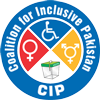Historically, persons with disabilities (PWDs), transgender persons, and women in Pakistan have been only minimally engaged in civil society’s election-related initiatives. These target populations face a myriad of societal, structural, and systematic barriers to their electoral and political participation. In addition, their broader human rights are not adequately addressed by political parties, candidates, and elected representatives.
In a bid to increase inclusiveness and capacities of PWDs, transgender persons, and women in civil society’s oversight of electoral activities, 15 civil society organizations working on the electoral, social, and political mainstreaming of marginalized segments unified their efforts under the banner of the Coalition for Inclusive Pakistan (CIP), in 2017, with the support of the United States Department of State.
For the first time in the history of Pakistan, 15 Long Term Observers (LTOs), including five each amongst PWDs, transgender persons, and women, and 375 Election Day Observers (EDOs) including 125 women, 125 transgender persons, and 125 PWDs were hired to observe the election processes in the 2018 General Elections and documented their unique experiences as election observers and voters. Furthermore, observations made by CIP observers resulted in the culmination of a comprehensive report revealing systematic and attitudinal barriers restricting the electoral participation of these groups.

